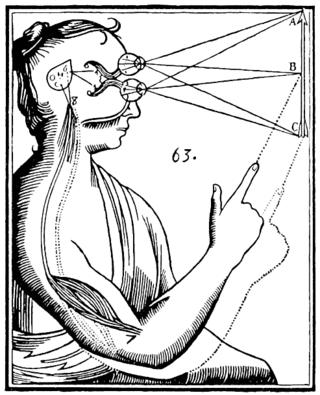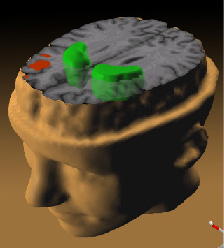Epiphenomenalism is a position on the mind–body problem which holds that physical and biochemical events within the human body are the sole cause of mental events. According to this view, subjective mental events are completely dependent for their existence on corresponding physical and biochemical events within the human body, yet themselves have no influence over physical events. The appearance that subjective mental states influence physical events is merely an illusion. For instance, fear seems to make the heart beat faster, but according to epiphenomenalism the biochemical secretions of the brain and nervous system —not the experience of fear—is what raises the heartbeat. Because mental events are a kind of overflow that cannot cause anything physical, yet have non-physical properties, epiphenomenalism is viewed as a form of property dualism.
Hedonism refers to a family of theories, all of which have in common that pleasure plays a central role in them. Psychological or motivational hedonism claims that human behavior is determined by desires to increase pleasure and to decrease pain. Normative or ethical hedonism, on the other hand, is not about how humans actually act but how humans should act: people should pursue pleasure and avoid pain. Axiological hedonism, which is sometimes treated as a part of ethical hedonism, is the thesis that only pleasure has intrinsic value. Applied to well-being or what is good for someone, it is the thesis that pleasure and suffering are the only components of well-being. These technical definitions of hedonism within philosophy, which are usually seen as respectable schools of thought, have to be distinguished from how the term is used in "everyday language". In that sense, it has a negative connotation, linked to the egoistic pursuit of short-term gratification by indulging in sensory pleasures without regard for the consequences.

The mind is that which thinks, imagines, remembers, wills, and senses, or is the set of faculties responsible for such phenomena. The mind is also associated with experiencing perception, pleasure and pain, belief, desire, intention, and emotion. The mind can include conscious and non-conscious states as well as sensory and non-sensory experiences.
Psychological egoism is the view that humans are always motivated by self-interest and selfishness, even in what seem to be acts of altruism. It claims that, when people choose to help others, they do so ultimately because of the personal benefits that they themselves expect to obtain, directly or indirectly, from so doing.
In ethical philosophy, utilitarianism is a family of normative ethical theories that prescribe actions that maximize happiness and well-being for all affected individuals.

Sentience is the capacity of a being to experience feelings and sensations. The word was first coined by philosophers in the 1630s for the concept of an ability to feel, derived from Latin sentiens (feeling), to distinguish it from the ability to think (reason). In modern Western philosophy, sentience is the ability to experience sensations. In different Asian religions, the word "sentience" has been used to translate a variety of concepts. In science fiction, the word "sentience" is sometimes used interchangeably with "sapience", "self-awareness", or "consciousness".
Pleasure refers to experience that feels good, that involves the enjoyment of something. It contrasts with pain or suffering, which are forms of feeling bad. It is closely related to value, desire and action: humans and other conscious animals find pleasure enjoyable, positive or worthy of seeking. A great variety of activities may be experienced as pleasurable, like eating, having sex, listening to music or playing games. Pleasure is part of various other mental states such as ecstasy, euphoria and flow. Happiness and well-being are closely related to pleasure but not identical with it. There is no general agreement as to whether pleasure should be understood as a sensation, a quality of experiences, an attitude to experiences or otherwise. Pleasure plays a central role in the family of philosophical theories known as hedonism.

In the philosophy of mind, mind–body dualism denotes either the view that mental phenomena are non-physical, or that the mind and body are distinct and separable. Thus, it encompasses a set of views about the relationship between mind and matter, as well as between subject and object, and is contrasted with other positions, such as physicalism and enactivism, in the mind–body problem.
In philosophy of mind, functionalism is the thesis that each and every mental state is constituted solely by its functional role, which means its causal relation to other mental states, sensory inputs, and behavioral outputs. Functionalism developed largely as an alternative to the identity theory of mind and behaviorism.

Suffering, or pain in a broad sense, may be an experience of unpleasantness or aversion, possibly associated with the perception of harm or threat of harm in an individual. Suffering is the basic element that makes up the negative valence of affective phenomena. The opposite of suffering is pleasure or happiness.

The hard problem of consciousness is a philosophical problem concerning why and how humans and other organisms have qualia, phenomenal consciousness, or subjective experiences. This is in contrast to the "easy problems" of explaining the physical systems that give humans and other animals the ability to discriminate, integrate information, perform behavioural functions, or provide behavioural reports, and so forth.

Ted Honderich is a Canadian-born British professor of philosophy, who was Grote Professor Emeritus of the Philosophy of Mind and Logic, University College London.
The subjective character of experience is a term in psychology and the philosophy of mind denoting that all subjective phenomena are associated with a single point of view ("ego"). The term was coined and illuminated by Thomas Nagel in his famous paper "What Is it Like to Be a Bat?"

Philosophy in the Boudoir is a 1795 book by the Marquis de Sade written in the form of a dramatic dialogue. Though initially considered a work of pornography, the book has come to be considered a socio-political drama. Set in a boudoir the two lead characters make the argument that the only moral system that reinforces the recent political revolution is libertinism, and that if the people of France fail to adopt the libertine philosophy, France will be destined to return to a monarchic state. In the chapter titled "Fifth Dialogue", there is a lengthy section where the character Chevalier reads a philosophical pamphlet titled "Frenchmen, Some More Effort If You Wish To Become Republicans". The pamphlet clearly represents Sade's philosophy on religion and morality, a philosophy he passionately hopes the citizens of France will embrace and codify into the laws of their new republican government. Continually throughout the work, Sade makes the argument that one must embrace atheism, reject society's beliefs about pleasure and pain, and further makes his argument that if any crime is committed while seeking pleasure, it cannot be condemned.
A mental state, or a mental property, is a state of mind of a person. Mental states comprise a diverse class, including perception, pain/pleasure experience, belief, desire, intention, emotion, and memory. There is controversy concerning the exact definition of the term. According to epistemic approaches, the essential mark of mental states is that their subject has privileged epistemic access while others can only infer their existence from outward signs. Consciousness-based approaches hold that all mental states are either conscious themselves or stand in the right relation to conscious states. Intentionality-based approaches, on the other hand, see the power of minds to refer to objects and represent the world as the mark of the mental. According to functionalist approaches, mental states are defined in terms of their role in the causal network independent of their intrinsic properties. Some philosophers deny all the aforementioned approaches by holding that the term "mental" refers to a cluster of loosely related ideas without an underlying unifying feature shared by all. Various overlapping classifications of mental states have been proposed. Important distinctions group mental phenomena together according to whether they are sensory, propositional, intentional, conscious or occurrent. Sensory states involve sense impressions like visual perceptions or bodily pains. Propositional attitudes, like beliefs and desires, are relations a subject has to a proposition. The characteristic of intentional states is that they refer to or are about objects or states of affairs. Conscious states are part of the phenomenal experience while occurrent states are causally efficacious within the owner's mind, with or without consciousness. An influential classification of mental states is due to Franz Brentano, who argues that there are only three basic kinds: presentations, judgments, and phenomena of love and hate.

Type physicalism is a physicalist theory in the philosophy of mind. It asserts that mental events can be grouped into types, and can then be correlated with types of physical events in the brain. For example, one type of mental event, such as "mental pains" will, presumably, turn out to be describing one type of physical event.

Philosophy of mind is a branch of philosophy that studies the ontology and nature of the mind and its relationship with the body. The mind–body problem is a paradigmatic issue in philosophy of mind, although a number of other issues are addressed, such as the hard problem of consciousness and the nature of particular mental states. Aspects of the mind that are studied include mental events, mental functions, mental properties, consciousness and its neural correlates, the ontology of the mind, the nature of cognition and of thought, and the relationship of the mind to the body.
"Mad Pain and Martian Pain" is a philosophical article written by David Kellogg Lewis. Lewis argued, that a theory of pain must be able to reflect the most basic intuitions of both functionalism and identity theory. Because of such, he proposes the existence of two beings both in pain – one whose physical explanation of pain differs from ours and one whose reaction to pain differs from ours. Lewis states that any complete theory of the mind should be able to explain how each being is in pain.

In philosophy of mind, qualia are defined as instances of subjective, conscious experience. The term qualia derives from the Latin neuter plural form (qualia) of the Latin adjective quālis meaning "of what sort" or "of what kind" in relation to a specific instance, such as "what it is like to taste a specific apple — this particular apple now".
Hedonic motivation refers to the influence of a person's pleasure and pain receptors on their willingness to move towards a goal or away from a threat. This is linked to the classic motivational principle that people approach pleasure and avoid pain, and is gained from acting on certain behaviors that resulted from esthetic and emotional feelings such as: love, hate, fear, joy, etc. According to the hedonic principle, our emotional experience can be thought of as a gauge that ranges from bad to good and our primary motivation is to keep the needle on the gauge as close to good as possible.









